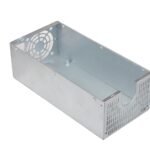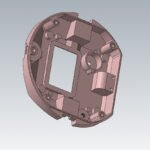A lot is happening in the manufacturing industry. Every process is becoming faster than ever before. Be it production or shipping speed!
Technology matters are not left behind. It is being advanced even in the CNC milling and turning services.
CNC stands for Computer Numerical Control. It feeds a machine with instructions to control the grinders, mills, lathes, and mills.
After that, the machine starts processing the raw material. It removes the excess and unwanted pieces to create your desired part.
CNC milling and turning technology have hit the metal forming industry with a bang. Giving the best outcome as compared to manual processing is a positive.
But what is CNC milling and turning? Do they have any differences? Let’s find out!
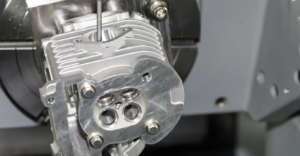
What Is CNC Milling?
This machining process manages the movement and operation of multi-point rotary cutting tools to cut and shape materials through computerized controls. The machining process boasts of producing custom-designed parts and products.
There is one thing that stands out about these specialized machines. An operator can perform CNC milling using various axes. However, the most common one is the 3-axis. It allows the cutting device to move in three directions, i.e., X, Y, and Z.
Thus, CNC milling also works best in woodworking, prototyping, modeling, aluminum machining, and cabinets.
The CNC milling machine can also cut various (hard and soft) solid materials. For example, copper, bronze, titanium, wood, plywood, zinc, nylon, PVC, steel, and aluminum.
Advantages
Prototype manufacturers can relish the many advantages that CNC milling has to offer. That’s why you should consider investing in one.
These CNC mills follow computer instructions. They move a rotating cutting tool along three or more axes.
Let’s delve at the advantages;
- It is more efficient because only a few steps are needed to produce parts.
- It can create complex shapes to the desired need.
- Compared to manual machining, CNC milling is more precise. It offers quality, and you can repeat the process more often.
- Mills are versatile hence being in a position to create different shapes to your liking.
What Makes CNC Milling Stand Out?
You can use various cutting tools to perform tasks like roughing and end-milling.
- They are good at post-machining. It can add details to molded, turned, or 3D printed parts.
- The CNC milling processing is repeatable and fast.
- It is compatible with many materials like composites, metals, and plastics.
- It produces a wide range of products than any other machine.
- CNC Milling is great for fast prototyping and mass production.
- It uses a shorter time to create lots of milling parts. Thus, it helps in reducing the number of operators and labor costs. It is possible without interfering with quality.
- CNC milling is affordable. Nothing beats affordability, so; this would not deter you from investing in one.
- What’s more, the cuts are always accurate. Also, the chances of human error are minimal.
- In matters of cutting purposes, CNC milling gives flexible computer control options.
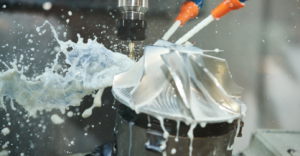
What Is CNC Turning?
CNC turning is a process that lets you create something to your desired shape and liking. Here, the material bars get held up in a chuck and rotated, and at the same time, a tool feeds to the piece to remove the material.
Furthermore, CNC turning is a process that many machinists use to make conical, rounded, and cylindrical parts.
However, CNC turning has the downside of not being versatile like CNC milling. Despite that, it stands out as the most popular CNC machining service. And, also in rapid prototyping service too.
Remember, the tools remain in the same place in the CNC turning. Instead, the material rotates at speed to create the exact shape.
The device that we call ‘chuck’ holds the workpiece and rotates it where a single-point cutting or boring tool helps cut the excess material from a piece to make a shape of the desired state.
Advantages
Here are some advantages of CNC turning that you would love to know.
- It is best known to be accurate.
- CNC turning can increase production speed
- It is efficient in production.
- It’s more cost-effective.
- CNC turning works at higher rates as compared to manual turning methods.
What Makes CNC Turning Stand Out?
You can create many products within a short period of using CNC turning. It happens because computer software automates to produce products at high speeds.
It Is the Most Efficient Production Method
You only need to program the software. After that, the machine creates hundreds of similar and precisely-cut products and parts. CNC turning can help you create complex parts. You can create difficult parts that need both external and internal specifications.
It Has Many Applications
These applications are shafts, sockets, valves, thread rods, fittings, forgings, etc. What’s more, CNC turning is heavily used in the transportation industry, agriculture, and aerospace.
Versatile Options
CNC turning uses CNC lathes. These machines remove the material till you get the desired look and diameter. With this, you can produce parts with both internal and external features. Examples are threads and slots.
Whenever customization is a must, CNC turning offers you exactly that. Your requirements and specifications get priority care to meet your desired taste.
Highly Accurate
CNC Turning reduces the number of clamping times and improves machining accuracy. It helps to drop accumulation errors when the number of card installations reduces.
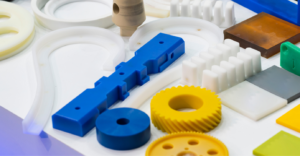
What Are the Main Difference Between CNC Milling and Turning
The only difference sets CNC turning and CNC milling apart, i.e., where the part of the machine lies.
In other words, which part moves during the operation. Is it the raw material or the machine itself?
In CNC Milling processes, the cutting tools rotate around the material. Likewise, in CNC Turning, those tools remain in the same place as the materials get rotated at speed to form the exact shape.
The above difference is the tip of the iceberg. Let’s delve more into ways to tell the difference between the two.
Cutting Tool: The cutting tool can be either single point or multi-point. It is single-point in CNC Turning, whereas multi-point in the CNC milling.
Surface: The CNC milling works better in machining irregular and flat surfaces. On the other hand, CNC turning works best on conical or cylindrical surfaces.
Cutting Operation: With CNC turning, there will be constant cutting. The workpiece retains continuous contact with the tool. In CNC milling, the cutting teeth will often engage and disengage from the workpiece. Thus, it applies intermittent cutting.
Chips Generation: CNC turning creates discontinuous, fragmented, and continuous chips. On the other hand, CNC milling creates sporadic chunks only when the cutting tool is in contact with the raw material.
When Should You Consider CNC Milling Instead of CNC Turning?
Be glad whenever you have the privilege of choosing between two tools. With this, you get to consider many things. You can decide what will work best for you and leave the rest that is not useful.
A comparison is a must. When choosing, the tool that will perform better and give the best results should always be at the back of your mind.
Now, with CNC milling and CNC turning, you need to know which machine will give you the desired final results.
When Should You Choose CNC Milling?
Let’s look at some things that can prompt you to choose CNC milling over CNC turning.
- When you want to develop something, CNC milling will serve you better. The reason is it works best on the surface working. That is grinding and cutting.
- It also works well on symmetrical and angular geometrics.
- The availability of the CNC milling machines in horizontal and vertical forms makes them unique. Each subtype can offer different results with its unique properties.
- A sturdy vertical machine is often versatile, giving you the best results in all types of work.
- On the other hand, horizontal mills come in handy. That’s because they are developed and made for mass production.
When Should You Choose CNC Turning?
CNC turning is best in the following situations.
- If you have low-volume prototyping production, CNC turning will be much suitable.
- When you deal with cylindrical or asymmetrical geometries, go for CNC turning.
- It is ideal when dealing with the high-volume production of complex parts like washers, screws, bearings, and bolts. Its efficiency is incredible.
So, that’s all about the CNC turning and CNC milling. Both these techniques have brought great advancements in the manufacturing sector.
You are sure of positive outcomes like enhanced safety, efficiency, and higher production speed. The best part of it all is saving on costs.
Final Thoughts!
Technology has made life and work easier for machinists. So, the hassle of manually operating the machines is no longer a concern because it’s part of the past now.
Invest in CNC machining service and see the difference it brings. But, before making a purchase, you need to know how CNC milling and CNC turning works.
Having a little knowledge about both processes can make a difference. It will help you stick to the option of using the suitable machine that suits you and give you the best results.
Both machines are vital parts of modern CNC machining. That is why most machinists use CNC machining services. Thus, every manufacturer should upgrade from traditional machining, requiring one operator per machine.
Remember, you are sure of guaranteed safety with CNC machines. What sets them apart is that they work without a guard or on a closed door.
Could you by any chance not be sure of what will work best for you in producing your part? Ask an experienced/expert machinist to take you through each step of the CNC milling and CNC turning.


